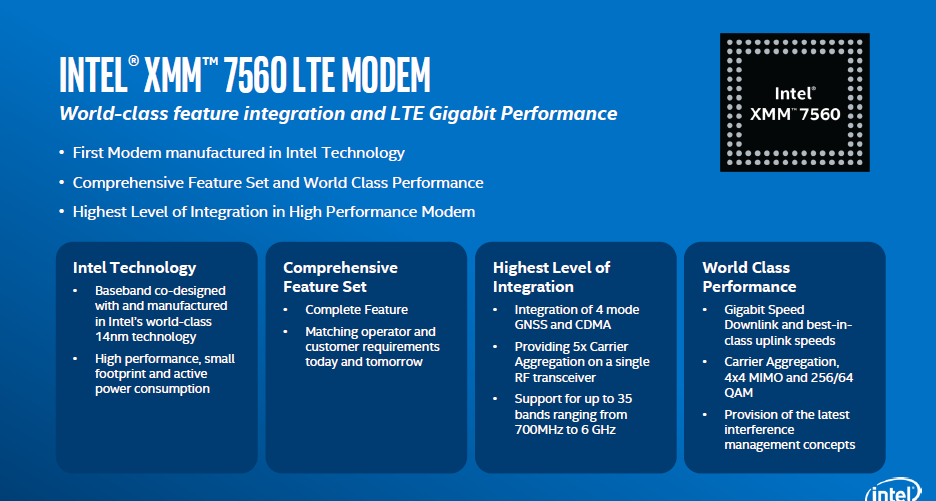Intel Starts Producing XMM 7560 Modem Chips For Apple's iPhones
Intel has reportedly started in-house production of its XMM 7560 modem chip for use in Apple's upcoming iPhone releases. Production of the chips was previously outsourced to Taiwan Semiconductor Manufacturing Co.--now it seems Intel plans to make the chips itself. Because of quality concerns with Intel's chips, however, Apple is expected to be forced to continue to purchase modem chips from Qualcomm.
The XMM 7560 is part of Intel's grand push to be a leader in fifth-generation (5G) wireless communications. Intel said the chip is capable of 1 Gb/s downloads and 225 Mb/s downloads; is built on its 14nm process, which should improve power consumption; and offers support for 35 LTE bands simultaneously. (We should note, however, that real-world performance will depend on individual smartphones and wireless networks.)
Wireless providers around the world are setting up their 5G networks, and with the annual release schedule for many flagship smartphones, it makes sense for wireless modem chip providers and mobile device manufacturers to prepare for the next generation of wireless communications. But this partnership also has another benefit--helping Apple replace Qualcomm's chips in the world's best-selling smartphones.
Apple has been feuding with Qualcomm since January 2017. The smartphone maker filed a $1 billion lawsuit in San Diego and a 1 billion yen lawsuit in Beijing alleging that Qualcomm charged unfair royalties. Qualcomm filed a countersuit, and after Apple allegedly withheld royalty payments from manufacturers, asked the U.S. International Trade Commission to bar iPhone sales and investigate Apple.
That prolonged battle started after the Federal Trade Commission (FTC) said Qualcomm had an unfair monopoly in the smartphone market. Mobile device makers like Apple now wish to distance themselves from Qualcomm, and that creates an opportunity for companies like Intel to swoop in. It's no wonder, then, that Intel has started to make the XMM 7560 in-house so it can prepare for the release of future iPhones.
Yet this isn't the end for Apple's reliance on Qualcomm. According to Nikkei, which reported on Intel's move to in-house production, "unidentified quality issues" will force Apple to purchase some modem chips from Qualcomm. That means Apple's divorce from Qualcomm will take a little while longer. The ultimate goal of shifting every iPhone to Intel's chips remains the same, though, with the question being when that will happen.
Get Tom's Hardware's best news and in-depth reviews, straight to your inbox.

Nathaniel Mott is a freelance news and features writer for Tom's Hardware US, covering breaking news, security, and the silliest aspects of the tech industry.
-
Stephen_144 "capable of 1 Gb/s downloads and 225 Mb/s downloads;" I think you mean 225 Mb/s uploadsReply -
yeeeeman I think that the difference in performance is negligible now that Qualcomm has 1.2 Gbps modem and Intel has 1Gbps for iPhone X2. What really matters and hope that Intel improved on, is the signal reception. Last gen was pretty good still, but speed dropped faster compared to Qualcomm modem. Speeds over 500mbps are already fast enough, so what is left to do really is to improve power consumption and signal reception.Reply
